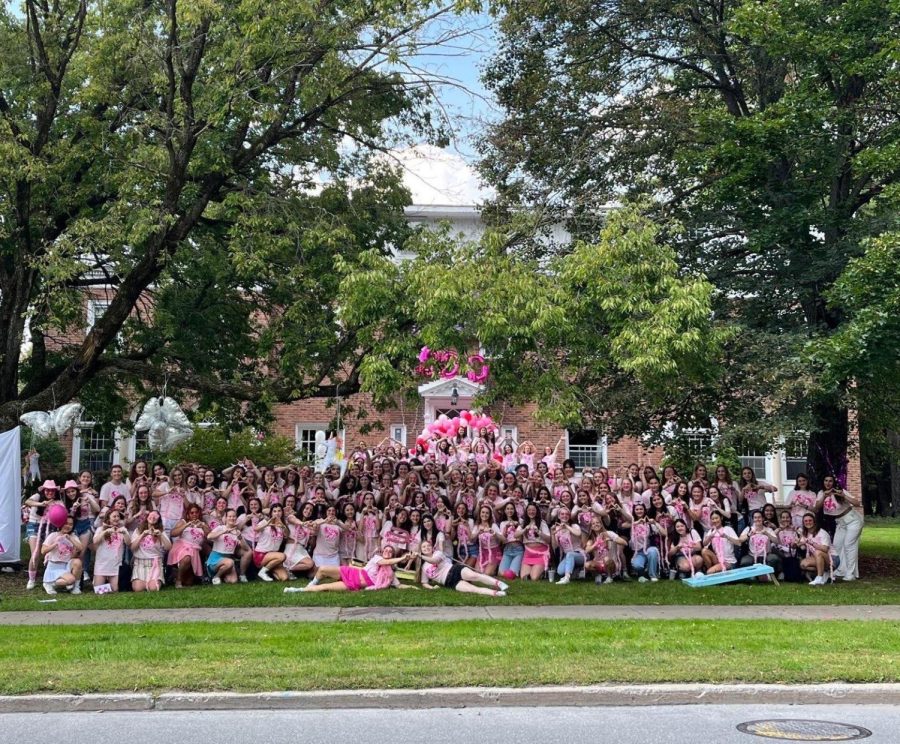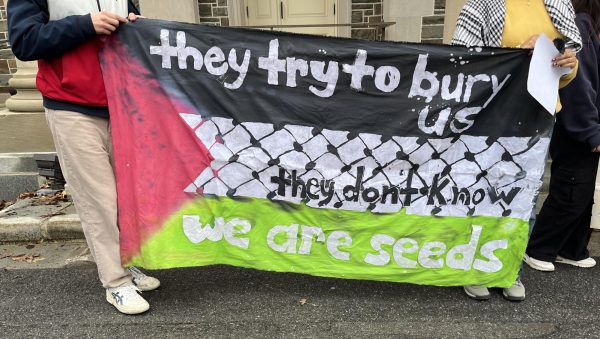Greek Life Recruitment Commences Without COVID-19 Restrictions
The Fall fraternity and sorority recruitment process, planned by the Panhellenic Association and Inter-Fraternity Council, was held Sept. 13 through 18, according to an email from Dean of Students Dorsey Spencer on July 29. Besides no longer having COVID-19 restrictions, changes to recruitment included some organizations dropping new member fees, fraternity and sorority recruitment on the same dates, as well as staffing changes to the Office of Fraternity and Sorority Advising (OFSA).
The participating chapters recognized by the University, the formal Panhellenic Council (CPH) and Interfraternity Council (IFC) are Delta Delta Delta, Gamma Phi Beta and Kappa Kappa Gamma for sororities; and Beta Theta Pi, Delta Upsilon, Theta Chi, Phi Delta Theta and Phi Kappa Tau for fraternities.
Junior Eric Barber, a Recruitment Chair for Phi Delta Theta, noted that this year looked much different than last Fall’s recruitment.
“While fraternity recruitment happened basically this same time last year, sorority recruitment was at least a couple of weeks after,” Barber said. “This doesn’t really change how rush itself operates, but I think I have noticed that it has increased the general climate of anxiety around campus. Recruitment is a really overwhelming process for everyone involved, so having them concurrently means that everyone is feeling that pressure at the same time.”
Other students who have been through the recruitment process felt that the lack of masks and COVID-19 restrictions made events run smoother, according to junior Riley Farbstein. Most students who are current members of Greek-letter organizations (GLOs) have not yet experienced recruitment fully in person. For the Class of 2023, recruitment was entirely on Zoom, and for the Class of 2024, recruitment was a mix between in-person events with masks and virtual zoom conversations.
“Last year recruitment was with masks on and outside in a tent, and it was definitely hard to get a read on the people you were talking to because we couldn’t tell facial expressions,” Farbstein said. “This year it is all inside with no masks, so girls can actually go into the house on the first day and see what it is like. I feel like it is a lot easier to get to know people without masks.”
The Office of Fraternity and Sorority Advising also experienced a staffing shakeup, including former Director of Fraternity and Sorority advising, Amber Decker and former Program Coordinator for Fraternity and Sorority Advising, Daniel McBurney, stepping down from their positions. Students can still email [email protected] for any questions or concerns, and Dean Dorsey Spencer, Dean of Students will be filling in, according to an email from Decker on July 5.
“It definitely led to a lack of communication,” Barber said. “I constantly had Potential New Members (PNMs) asking me how to sign up for recruitment, or what the schedule would look like for the week because they had received no info from the school. I definitely understand that the school was in a tough position with two leaders in the OFSA leaving, but I think those two losses definitely lead to some communication issues.”
Despite changes to the overall recruitment process for all GLOs, Phi Delta Theta also dropped their new member and initiation fees. Chairman of the New York Zeta Fund of the PDT Foundation, Bill Baker ‘70, established a fund from alumni in order to cover new member fees for students who weren’t able to afford them. After realizing that they could raise more money to cover all fees, Baker was able to cover the costs for all new members of the New York Zeta chapter of Phi Delta Theta for this semester.
“Due to the generosity of a number of alumni brothers, the occasional bequest and smart investing on National’s part, the NYZ Fund has grown to be the largest of any such within the Phi Delta Theta fraternity,” Baker said. “So large, in fact, that for the past few years we have not distributed the maximum allowed under the rules. So I began thinking… what if?”
Dropping new member and initiation fees allows students to not have to factor in cost when considering what house they want to join and by getting rid of these, Phi Delta Theta will be able to chip away at the barrier to entry for GLOs, according to Barber.
“There are so many people who would make amazing additions to GLOs on campus who simply can’t afford to join, so by getting rid of new member fees we were able to start to chip away at this barrier,” Barber said. “That doesn’t mean cost as an impediment to joining isn’t still there, but we’re continuing to work on it, and knowing that our alumni [are] backing us up in that endeavor makes me super proud.”
After the recruitment process was over, organizations sent bids to students on Sunday, Sept. 18, also known as “Bid Day.”

Sophie Mack is a senior from San Francisco, CA concentrating in art history and minoring in political science. She has previously served as a staff writer...







